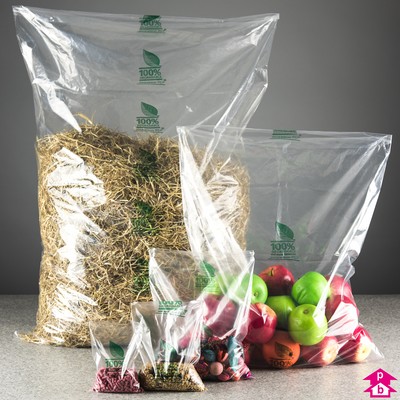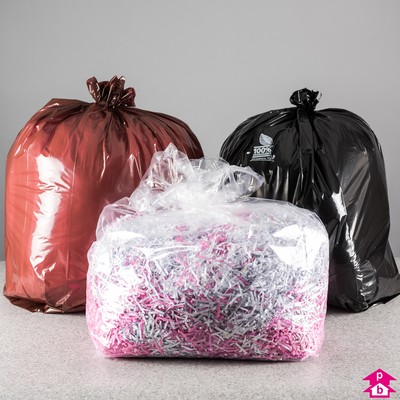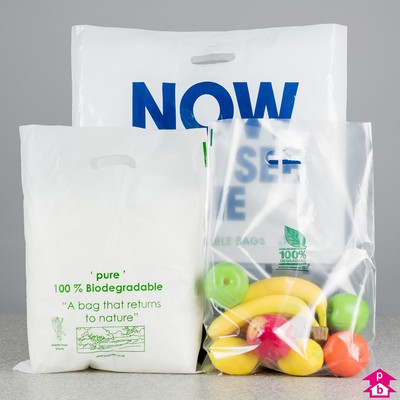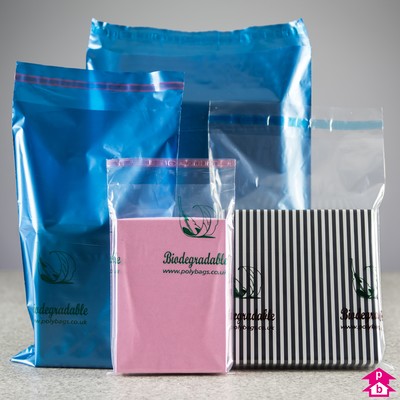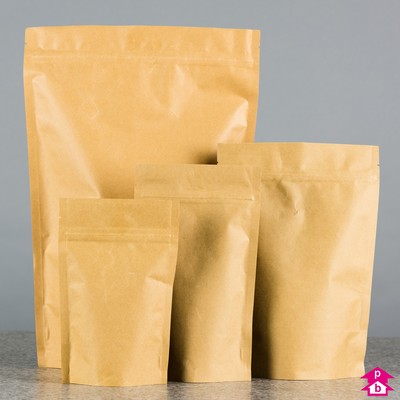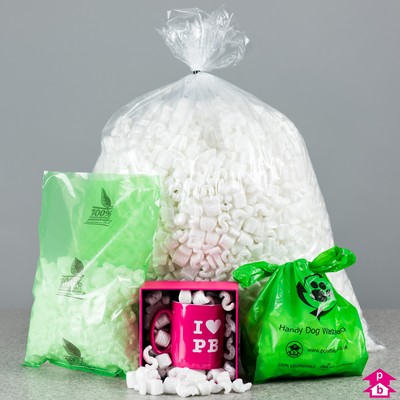Biodegradable Ireland - for bags that don't cost the earth
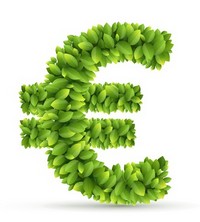
Welcome to Biodegradable.ie - the website from Polybags UK dedicated to Irish customers who want to do their bit for the environment.
As the UK's number one manufacturer of polythene packaging and eco-friendly alternatives, Polybags has a marketing-leading range of green packaging, including compostable and biodegradable ranges, plus products made from 100% recycled material and carbon-neutral, renewable bioplastic.
Whether you're looking for compostable carrier bags, 100% recycled mailing bags or carbon-neutral packing bags, you'll find all the eco-products you need at Polybags.
We offer fast delivery to Ireland plus no VAT and great savings on bulk orders for Irish customers.
Buy in pounds, save in Euros - with a big buy-in-bulk bonus
With Sterling's weakness in the currency market, your Euros go further, so you can buy in pounds and save in Euros!
New customs regulations and increased courier costs mean that small orders do cost a little more post-Brexit, but Polybags' Irish customers who buy in bulk can still take advantage of free delivery to Ireland.
All orders over £180 come with fast and free delivery - add to that the favourable exchange rate and you've got yourself a bulk-buy packaging bargain!
Our green credentials
Polybags take environmental matters very seriously. As a responsible packaging manufacturer, we understand the responsibility we have as a company, both to our environment and to the generations who will inhabit our planet in the future.
We manufacture a huge range of eco-friendly packaging that minimises environmental impact, whilst still enabling you to get the job done with the minimum of fuss, including a wide range of fully compostable products made from natural, starch-based bio-polymers.
We operate a 100%-recycling principle, with manufacturing processes designed to minimise waste wherever possible. We collect all waste in-house and use it to make new products, unless doing so is less energy-efficient than disposing of it.
Our eco-packaging range is expanding all the time, with our compostable, biodegradable and 100%-recycled ranges now accompanied by many products made from renewable material and our innovative I'm Green carbon-neutral range.
Latest news and views on biodegradable packaging
100PC Non-Woven Grow Biodegradable Bags
Good-quality materials make big grow bags because they prevent them from tearing easily. Also, these grow bags are perfect because they are eco-friendly. Biodegradable bags are the optimal alternatives to plastic grow bags. Plastic grows bags remain on the earth’s surface even after years of being buried underground. Non-woven grow bags, on the other hand, biodegrade after a few months. More importantly, you don’t need to remove the grow bag anymore when transferring your plant to a pot or to the ground. Plastic bags also have to removed before you can transport your plant so things can acquire certainly messy. Finally, you can do something superb for the environment now with these Non-woven Biodegradable Grow Bags!
Packaged in 100% Biodegradable bags manufactured from kraft paper, cellulose and starch film. GMO complimentary.
The Essentials of Compostable Packaging
This course discusses key views like the contrast between biodegradability and compostability, in addition to providing a nuanced analysis of compost manufacturers' views on compostable packaging.
Recent Biodegradable Packaging Inquiries
Over 40 years of experience working for fortune 500 companies. A proven history of solving complex t Praveen Polymer/Materials Engineer 3d printing, polymer blends and alloys, polymer composites, biodegradable polymers & polymer composi See More Experts Share LinkedIn Twitter Facebook Google+ Popular Areas MVNO Filtration Food Safety Football Publishing Medical Device Dyes And Pigments 510k CPG Healthcare Market Research Derivatives Commodities NGO Construction Metals PPP Auto Parts Looking for an expert or vendour in the Biodegradable Packaging field? You will come by an expert or vendour well-suited to your project by browsing our database of experts / vendours. Zintro experts / vendours have helped a number of alternative types of organizations solve a wide assortment of alternative types of issues. Post an inquiry or contact a specific Zintro expert / vendour now!
Why Use Biodegradable Packaging When it is So Easy to Recycle?
Furthermore, we encourage our clients to collect packaging together with food waste in specially labeled bins and send it away for composting. Have a see at our list of composting service providers to come by one in your area. This is our favourite optimal case scenario because biodegradable packaging and the food will not reach a landfill. It is sent away to become useful and can be used as compost to feed plants.
Bio Degradable Corn Starch Bags
We are the leading supplier of high quality BIO DEGRADABLE CORN STARCH BAGS at nominal price in United Kingdom. The spectrum of Starch Bags offered by us is handpicked from our most credible and properManufacturers. Our products comply will all Govt. Norms and has all the necessary Certifications. Our Bio Bags are 100% plastic complimentary and are manufactured entirely from vegetable starch and other normal extracts. These bags are harmless to the plants, animals and all the environment. We not ever compromise on quality for reducing price for the clients. We make sure each product is at top notch quality.
Global Biodegradable Plastic Packaging Market Analysis Trends, Applications, Analysis, Growth, and Forecast to 2028
However, high cost of biodegradable plastics and easy availability of cost-effective alternatives are leading factours expected to hamper growth of the global market.
Sep 21, 2019 (SUPER MARKET RESEARCH via COMTEX) -- According to the latest report by IMARC Group, titled " Green Packaging Market: Global Industry Trends, Share, Size, Growth, Opportunity and Forecast our telephone ", the global green packaging market size reached US$ 168.2 Billion in 2018. Green packaging, or sustainable packaging, is a type of packaging manufactured from materials which require less energy amid production and have a low impact on the environment.
Jen and the Great One (or other part of literature that shares importance of earth), recyclable items, litter, plastic gloves, plastic/environmental bags, camera.
Why degradable or biodegradable packaging?
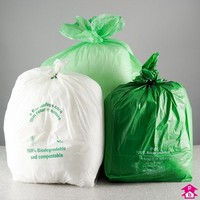
Biodegradation is the process by which organic substances are broken down by the enzymes produced by living organisms.
The website Packagingknowledge.com states: "Conventional plastics do not break down. Litter and landfill waste may take years to degrade. Another problem with ordinary plastics is that anything contained within them may not reach their full degradation potential. This results in a needless waste of valuable landfill space."
Based on the material used, bioplastics can take varying lengths of time to totally compost, but usually biodegrade up to 60% within 90 to 180 days. It is also important to know the differences between degradable, biodegradable and compostable.
Compostable
"Capable of undergoing biological decomposition in a compost site as part of an available program, such that the plastic is not visually distinguishable and breaks down to carbon dioxide, water, inorganic compounds, and biomass, at a rate consistent with known compostable materials (e.g. cellulose) and leaves no toxic residue." - American Society for Testing & Materials (ASTM).
So in order for a plastic to be called compostable it needs to meet three rules:
- It needs to be able to biodegrade, i.e. it needs to break down into carbon dioxide, water and biomass at the same rate as cellulose (paper)
- The material has to fully disintegrate, i.e. be indistinguishable in the compost
- Eco-toxicity - the biodegradation must not produce any toxic material so that the compost can support plant growth
Biodegradable plastic
Biodegradable plastic is one which can be chemically degraded via natural effectors such as soil bacteria, weather, plants or animals.
Note that there is no requirement for leaving no toxic residue, as well as no requirement for the time it takes to biodegrade.
Degradable plastic
By definition, this term refers to a plastic film containing a controlled percentage of an appropriate non-toxic, non-tinting additive, which will enable the plastic film to totally degrade when exposed to aerobic or anaerobic conditions, including when disposed in a landfill or other regulated dumping area, and within such period of time as specified.
A plastic therefore may be degradable but not biodegradable or it may be biodegradable but not compostable, i.e. it breaks down too slowly to be called compostable or leaves toxic residue.










